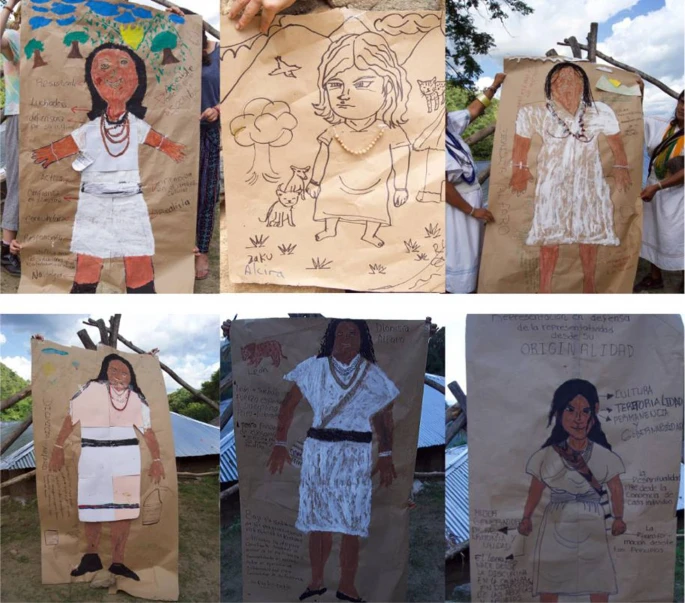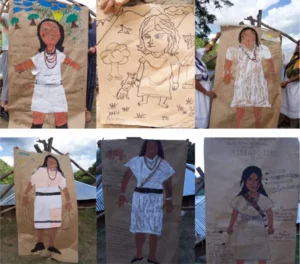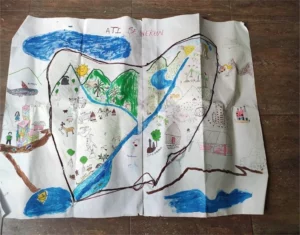
Arhuaca women, memory and political tensions: Juliana González contributes to an article for the Zeitschrift für Friedens und Konflikt
CAPAZ Science Collaborator, Juliana González, recently published an article in the German journal Zeitschrift für Friedens und Konfliktforschung (Journal of Peace and Conflict Studies), which she wrote together with Ángela Santamaría, Dunen Kaneybia Muelas Izquierdo, Laura María Restrepo Acevedo, and Paula Cáceres Dueñas, all researchers at CAPAZ partner Universidad del Rosario.
In the article, Arhuaco indigenous women’s memories and the Colombian Truth Commission: methodological gaps and political tensions (La memoria de las mujeres indígenas Arhuaco y la Comisión de la Verdad de Colombia: brechas metodológicas y tensiones políticas), the researchers analyze the process by which they prepared a report together with the Arhuaca women. This was presented to the Truth Commission (CEV) in July 2020, in an online event supported by CAPAZ as an Universidad del Rosario partner and the Truth Commission. Read the CAPAZ note about the presentation event.
Although the report highlighted the differential-intersectional (ethnic and gender) approach of the CEV, which has been a striking element in the context of truth commissions worldwide, in their article, the researchers propose a critical analysis of the methodology and the process of clarification carried out in the realization of the report. Accordingly, the text presents a series of methodological gaps and political tensions that became evident in the preparation of the report.
Access the broadcast presentation (Zaku Seynekun Nun nokwuzanamu: voices of mother earth) here.
The political and spiritual importance of the Arhuaca woman’s body
One of the methodological gaps that the researchers were able to recognize in this context was the importance in political and spiritual terms of women’s bodies as a human representation of the territory of the Sierra Nevada. This is important to understand because it is a mandate that constitutes and permeates many of the social relationships that are woven between individuals and with the territory itself. Thus, the article mentions that for many years the work of Arhuaca women has been to legitimize their role as spiritual and political leaders of the community. This work constitutes, in itself, a methodology of work and resistance, and this is where the CEV enters into dissonance: speaking and naming the traumatic experiences that occurred in the context of the armed conflict is not in itself a way to weave and strengthen the bonds that the conflict destroyed. On the other hand, recognizing women as the representation of the feminine principle of all that exists in the universe gives them the possibility to guarantee their right as political, traditional spiritual and cultural authorities in accordance with the Law of Origin.

(Photo taken from: Escuela Intercultural de Diplomacia Indígena)
Epistemological and language differences in approaching the past
Another important point mentioned by the researchers in their text is the difference between privileging the factual reconstruction of the violent events and the Arhuaca way of understanding the past in ontological terms. In this community, there is an “ethical principle of non-violence that teaches that in order to repair and harmonize the physical and spiritual imbalances left by violent acts, the violence itself must not be named”. Thus, the mandate of the CEV, despite being important in its mission to collect and systematize the violent processes that have taken place in different parts of the country, would be omitting a fundamental component of the Arhuaca culture in its process of establishing balance after a victimizing event.
In addition, another gap in this respect is that, often, the indigenous communities’ way of conceiving time is not linear. For the Arhuacos, “the time we have before us is the time that has already passed”, which complicates the narration of violent events that occurred in the past (this being a term used in western spaces different from that of the Arhuacos).
Obstacles to indigenous women’s full participation in the truth-seeking process

(Photo taken from: Escuela Intercultural de Diplomacia Indígena)
Finally, it is worth highlighting what the researchers called a “political tension” in constructing a narrative about the truth: “The experience of the Arhuaca women before the CEV also highlights that another obstacle to the full participation of indigenous women in truth-seeking processes is the institutional relationship with indigenous leaders who, according to “orthodox” interpretations of traditional laws, continue to claim that indigenous women cannot interfere with the state”.
You might also like: «Las arhuacas también vivieron violencia sexual por parte de militares» – Colombia2020 El Espectador



